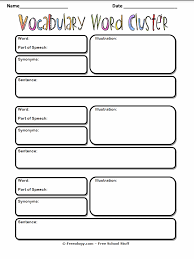Introduction
Expanding vocabulary is crucial for middle school students as it lays the foundation for better reading comprehension, stronger writing skills, and improved communication abilities. Teachers and parents can introduce fun and engaging activities to help students build their vocabulary and encourage a love for language. Here are 20 effective vocabulary activities for middle school students.
1. Word of the Day: Introduce a new word each day and encourage students to use it in their written or verbal communications.
2. Vocabulary Wall: Create a designated space or bulletin board where students can write unfamiliar words, add definitions, and contribute examples.
3. Synonym Swap: Encourage students to replace overused words with descriptive synonyms in their writing.
4. Vocabulary Bingo: Create custom Bingo cards with vocabulary words, calling out the definition as students mark off corresponding words.
5. Storytime: Assign a list of vocabulary words, challenging students to create stories using the new terms.
6. Explore Word Origins: Research the etymology of assigned vocabulary words to help students understand language connections through history.
7. Word Charades: Incorporate new vocabulary into a game of charades or Pictionary.
8. Vocabulary Journal: Encourage daily journal entries with one or two assigned vocabulary words included in their writing.
9. Guessing Game: Provide a definition and have students guess the correct term by hinting towards its meaning without providing synonyms.
10. Word Ladder: Create puzzles that require students to change one letter at a time to form new words, ultimately ending with an assigned target word.
11. Antonyms Matching Game: Create flashcards with target words on one side and their antonyms on the other; have students match them as a memory game.
12. Poetry Connection: Have students craft poems using two or more assigned vocabulary words; discuss how the poet uses imagery and beauty to express ideas.
13. Song Lyrics Analysis: Assess popular song lyrics for target vocabulary words or related themes, then develop class discussions around the context and usage.
14. Comic Strip Creation: Assign new vocabulary words to be included in comic strips, encouraging creativity while reinforcing terms.
15. Skits: Have students work in groups to create skits that incorporate assigned vocabulary words, showcasing their understanding of the terms in a real-life context.
16. Crossword Puzzles: Create custom crossword puzzles using target vocabulary words as clues; students solve by finding the appropriate term.
17. Word Morphology: Examine word parts (prefixes, suffixes, and roots) to teach how specific forms contribute to word meaning.
18. Context Clues: Demonstrate how to understand new words by deciphering surrounding text clues; have students practice using this skill with age-appropriate literature.
19. Word Association: Introduce a target vocabulary word and have students brainstorm and share related words or phrases to help reinforce understanding.
20. Vocabulary Quizzes and Tests: Evaluate student progress regularly with quizzes that ask for definitions, synonyms, antonyms, and proper usage of each new term.
Conclusion
By incorporating these 20 effective vocabulary activities into your middle school curriculum, you will engage students in their language development while providing exciting opportunities for growth in verbal and written communication skills. The more frequently students are exposed to and practice using new vocabulary terms, the more confidently they will express themselves both academically and socially.



